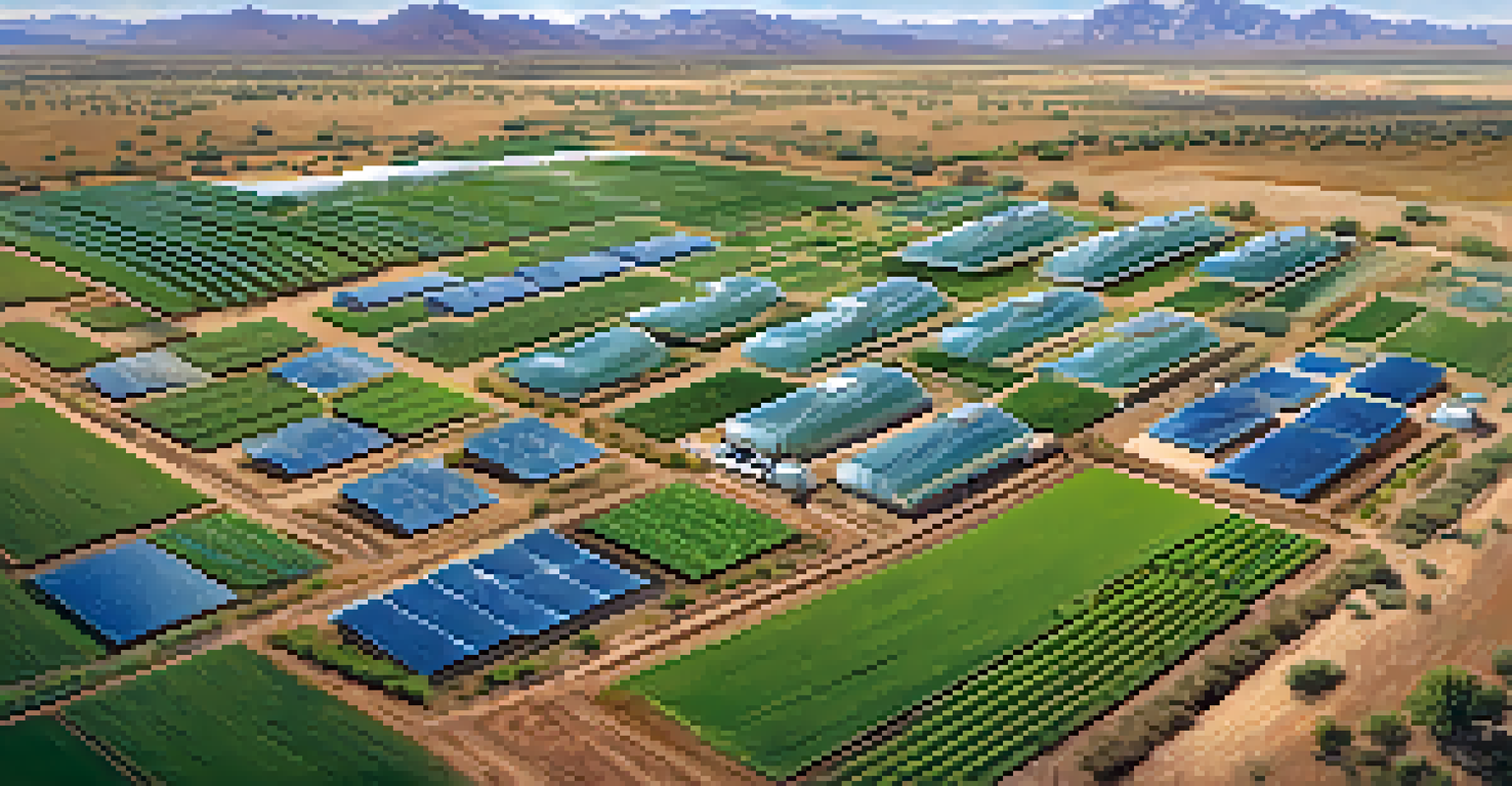Water Management Challenges in Arizona's Agricultural Sector

Understanding Arizona's Unique Climate and Water Needs
Arizona's climate is characterized by arid conditions and scarce rainfall, making water management a crucial concern for its agricultural sector. Farmers depend heavily on irrigation to sustain crops, which adds a layer of complexity to water use. In a region where water is a limited resource, understanding the delicate balance between agricultural needs and environmental sustainability becomes essential.
Water is the driving force of all nature.
The growing population and increasing urbanization in Arizona further exacerbate the water challenge. As cities expand, they compete with agricultural demands for available water resources. This competition can lead to conflicts between urban and rural water users, making it vital for farmers to adapt their practices to ensure they can access the necessary water for their crops.
Moreover, the state's reliance on water from the Colorado River highlights the importance of regional cooperation in water management. With ongoing drought conditions and climate change impacts, farmers must navigate the complexities of water allocation and usage rights to maintain their livelihoods while managing the environmental footprint of their practices.
Drought: A Persistent Challenge for Farmers
Drought is a recurring theme in Arizona, and its effects on agriculture are profound. Farmers face dwindling water supplies, which can lead to reduced crop yields and increased costs for irrigation. In extreme cases, some may even be forced to fallow their fields, leading to a loss of income and food supply.

The unpredictability of rainfall patterns can make planning difficult for farmers. Many rely on historical data to make crop decisions, but ongoing climate variability is changing those patterns. Consequently, farmers need to implement adaptive strategies, such as drought-resistant crops or efficient irrigation techniques, to mitigate the impacts of reduced water availability.
Water Management is Crucial in AZ
Arizona's arid climate necessitates effective water management strategies for agriculture to thrive amidst increasing urban demands.
Additionally, drought conditions can create a ripple effect throughout the agricultural supply chain, affecting not just farmers but also consumers and businesses reliant on agricultural products. This interconnectedness highlights the need for comprehensive water management policies that address the long-term sustainability of both agriculture and water resources.
The Role of Technology in Water Management
Advancements in technology are offering promising solutions to Arizona's water management challenges. Precision agriculture, for instance, utilizes data analytics and sensors to optimize water usage, ensuring crops receive the right amount of water at the right time. This not only conserves water but also enhances crop yields, making it a win-win for farmers.
We never know the worth of water till the well is dry.
Moreover, the integration of smart irrigation systems can help farmers monitor soil moisture levels in real time. By automating irrigation schedules based on actual plant needs, these systems reduce waste and promote sustainability. As technology continues to evolve, the potential for improving water efficiency in agriculture becomes even more significant.
However, adopting new technologies often comes with upfront costs and a learning curve. Farmers must weigh these factors against potential long-term savings and improved crop resilience. In this way, education and access to resources play a crucial role in ensuring that farmers can leverage technology effectively.
The Importance of Water Rights and Policies
Water rights in Arizona are a complex and often contentious issue that directly impacts agricultural practices. Historical water rights are rooted in the state's laws, creating a framework that determines how water is allocated among various users. Understanding these rights is crucial for farmers to navigate the legal landscape of water management.
Policy changes at both state and federal levels can have significant repercussions for agricultural water use. For example, initiatives aimed at conservation or changes in allocation can affect how much water farmers can access. Staying informed about these policies is essential for farmers to adapt their strategies and ensure they remain compliant while maximizing their water usage.
Drought Challenges Farmers' Yields
Persistent drought conditions in Arizona lead to reduced crop yields and increased irrigation costs, compelling farmers to adopt adaptive strategies.
Additionally, collaboration between policymakers and agricultural stakeholders is key to developing sustainable water management strategies. Engaging in dialogue can help bridge the gap between regulatory frameworks and the practical needs of farmers, ultimately leading to more effective water management solutions.
Community and Cooperative Efforts in Water Management
Community engagement plays a vital role in addressing water management challenges in Arizona. Farmers often come together to form cooperatives, pooling resources and sharing knowledge to optimize water usage. These collaborative efforts can lead to innovative solutions that benefit the entire agricultural sector.
Such cooperatives also provide a platform for farmers to advocate for their needs and share best practices. By working together, they can tackle common issues, such as drought response strategies or compliance with water regulations. This sense of community fosters resilience and adaptability among farmers, making them better equipped to face challenges.
Moreover, local initiatives focused on education and outreach can empower farmers to make informed decisions about water management. By promoting awareness of sustainable practices and water conservation methods, communities can collectively contribute to the long-term viability of Arizona's agricultural sector.
The Impact of Climate Change on Water Resources
Climate change poses a significant threat to water resources in Arizona, compounding existing challenges faced by the agricultural sector. Rising temperatures and altered precipitation patterns can lead to increased evaporation rates, further reducing available water supplies. Farmers must grapple with these changes while trying to sustain their livelihoods.
Research indicates that climate change may also affect the timing and intensity of rainfall events, creating unpredictable growing conditions. This variability can disrupt planting and harvesting schedules, making it difficult for farmers to plan effectively. Developing strategies to adapt to these changes is crucial for maintaining agricultural productivity.
Technology Enhances Water Efficiency
Advancements in technology, such as precision agriculture and smart irrigation, are pivotal in optimizing water usage and promoting sustainability in farming.
Furthermore, the long-term implications of climate change underscore the need for comprehensive water management strategies that consider future scenarios. By proactively addressing these challenges, farmers can work towards a more resilient agricultural system that can withstand environmental shifts.
Looking Ahead: Sustainable Solutions for the Future
As Arizona's agricultural sector faces increasing water management challenges, the focus is shifting toward sustainable solutions. Innovations in water conservation, such as rainwater harvesting and greywater recycling, are gaining traction among farmers looking to reduce their reliance on traditional water sources. These practices not only conserve water but also promote environmental stewardship.
Additionally, fostering a culture of sustainability within the agricultural community is essential for long-term success. By prioritizing practices that protect water resources, farmers can contribute to a healthier ecosystem while ensuring their operations remain viable. Education and support from agricultural organizations can help facilitate this cultural shift.

Ultimately, the future of water management in Arizona's agricultural sector hinges on collaboration, innovation, and a commitment to sustainability. By embracing these principles, farmers can navigate the challenges ahead while continuing to play a vital role in feeding the nation.